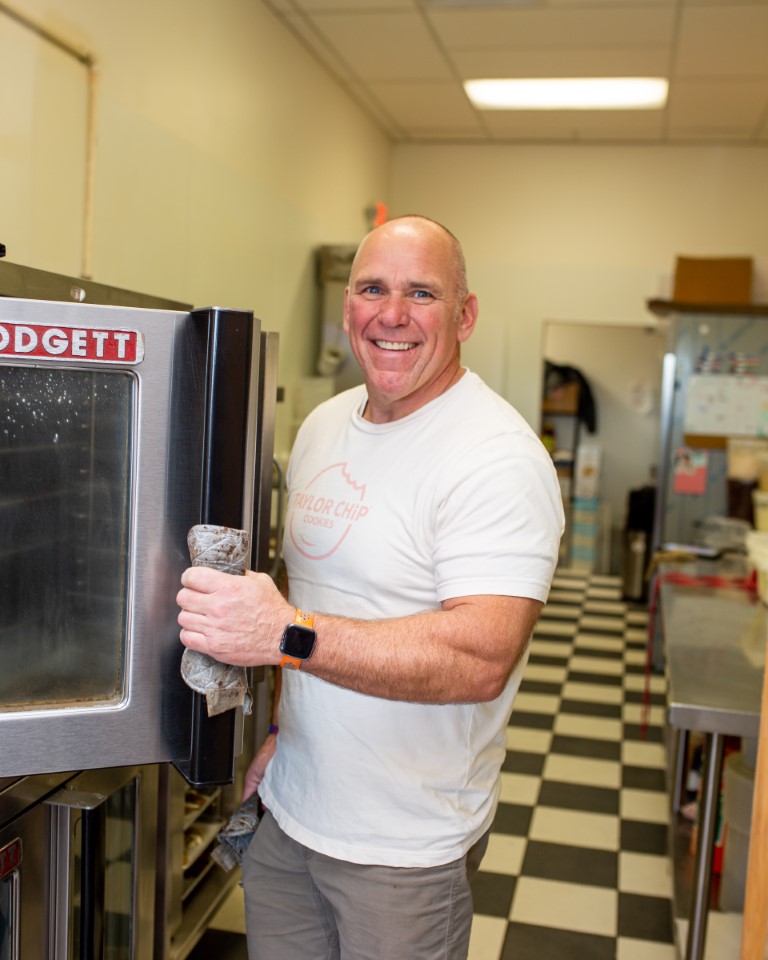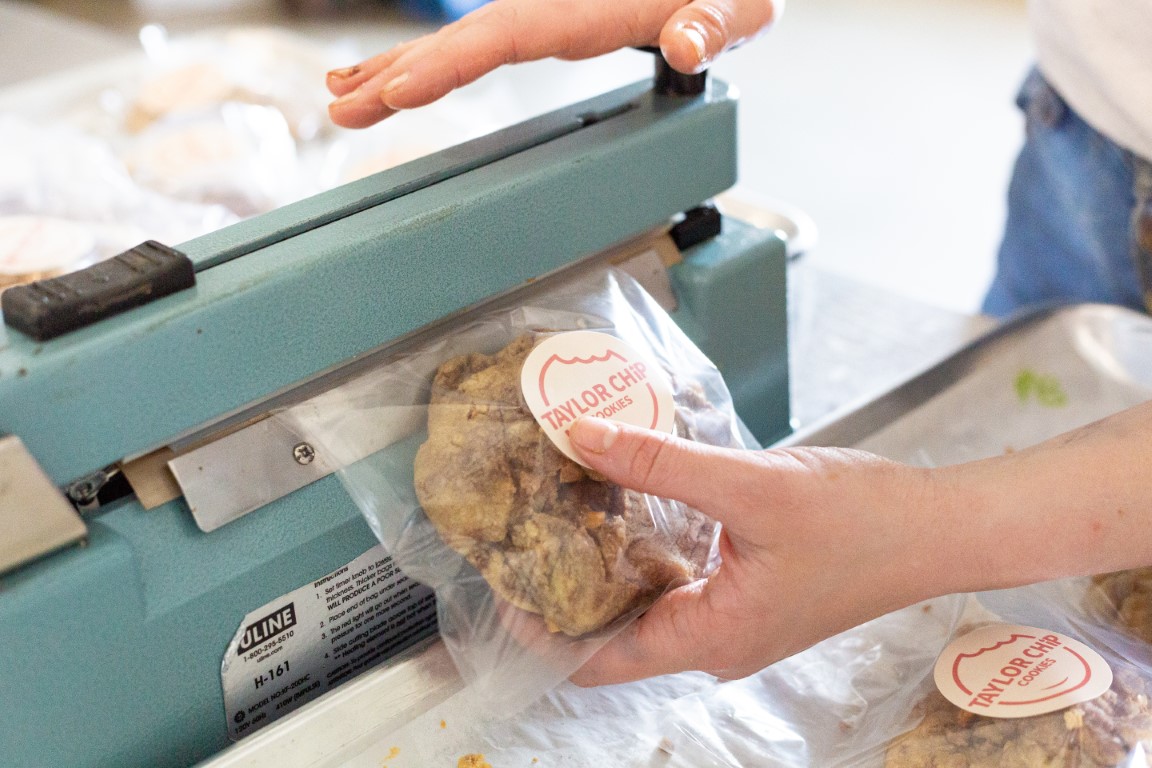You can bake cookies in a microwave oven, utilizing its rapid electromagnetic heating to achieve a gooey texture in under a minute. This method contrasts with traditional ovens, which rely on convection, and allows you to skip preheating and bake directly on a microwave-safe plate. Although the approach may result in varying textures, you can create quick and satisfying treats with basic ingredients like flour, butter, and chocolate chips. Employing microwave-safe dishes guarantees even cooking, while monitoring cooking times and using proper settings prevent overcooking. With further exploration, you'll uncover diverse recipes and techniques to perfect your microwave baking.
Key Takeaways
- Yes, cookies can be baked in a microwave using radiation, offering quick preparation without preheating.
- Microwave baking results in a gooey texture and is ideal for single-serve or small-batch cookie recipes.
- Use microwave-safe containers to ensure even cooking and prevent overheating during the baking process.
- Basic ingredients like flour, sugar, and chocolate chips are needed, with variations possible for different flavors.
- Monitor cooking time closely to avoid overcooking and achieve the desired cookie texture.
Microwave Baking Basics
When you're baking cookies in a microwave, you'll notice that the process differs greatly from traditional baking, primarily because microwaves heat food through radiation rather than convection, which affects how cookies rise and brown. This method offers benefits like speed and convenience, allowing you to enjoy freshly baked cookies in minutes, but it also has limitations, such as uneven cooking and texture differences. Understanding these differences helps you make informed choices about when to use your microwave for cookie baking and how to adjust your techniques for the best results.
How Microwave Cooking Differs From Traditional Baking
Microwave baking revolutionizes your approach to making cookies by using electromagnetic waves to heat and cook food more rapidly than traditional baking. You can experiment with different microwavable cookie recipes to create a microwave chocolate chip cookie in minutes. Unlike conventional ovens, a microwave oven doesn't require preheating or precise baking temperatures. Simply form dough balls, place them on a microwave-safe plate, and the cooking appliance handles the rest. Keep in mind, the cook time is considerably shorter, so a single cookie may be ready in under a minute, resulting in a gooey cookie texture. This method is perfect for those short on time, offering a quick alternative to traditional baking while still delivering rewarding results.
Benefits and Limitations of Microwave Cookie Baking
While traditional ovens have their merits, baking cookies in a microwave offers unique advantages that cater to modern lifestyles. You can quickly satisfy a cookie craving with microwave cookies, especially when you're short on time. Chocolate chip microwave cookies, for example, can be ready in minutes with just a safe plate, a tablespoon of milk, and a pinch of salt. The microwave method allows for a gooey, chewy texture that many cookie lovers enjoy.
However, there are also limitations. Achieving the perfect cookie texture can be challenging, as microwaves can sometimes produce uneven results. Additionally, using the right baking dish is essential to avoid overheating. Despite these challenges, the convenience and speed of microwave baking make it an appealing option for quick treats.

Choose Your Own Delightfully Perfect Cookies.
With almost 30 flavors to choose from, you can make your box as unique as you are.
Best Cookie Recipes for Microwave Baking
When you're baking cookies in a microwave, single-serve mug cookie recipes and small batch options offer convenience and ease without sacrificing flavor. These recipes are perfect for quick treats or when you want to avoid making a large batch, catering to both solitary indulgences and small gatherings. You'll find that microwave mug cookies can be prepared in minutes, using simple ingredients you likely already have at home, while small batch recipes guarantee you can enjoy fresh cookies with minimal prep and cleanup.
Single-Serve Mug Cookie Recipes
Have you ever craved a warm, gooey cookie but didn't want to bake a whole batch? A single-serve mug cookie might be the perfect solution for you. Start by melting unsalted butter in a medium bowl. Add wet ingredients like vanilla extract, then stir in chocolate chips. This minute chocolate chip cookie offers a quick and satisfying treat. The key to achieving the right cookie dough texture is ensuring all components are well-mixed. Once you've combined everything, pour the mixture into a microwave-safe mug. Follow the entire microwave cookie recipe carefully, and microwave the mug for about a minute. In no time, you'll have a delicious, personal-sized dessert that satisfies your sweet tooth without the hassle of traditional baking.
Small Batch Cookie Options
Imagine whipping up a batch of cookies without the wait or mess of traditional baking. Small batch cookie options in the microwave allow you to enjoy homemade cookies quickly. Start by preparing your cookie dough, perfect for eggless chocolate chip cookies or chocolate chip cookie bars. These individual treats can be ready in minutes, offering delightful results without the need for an oven.
You might even experiment with convection cooking time or an air fryer for variety. Pair your warm cookies with a scoop of vanilla ice cream for a satisfying dessert. Whether you're making a small batch for yourself or sharing with a friend, these options are ideal for quick, delicious results without the usual hassle of larger baking projects.
Essential Ingredients and Equipment
To bake cookies in a microwave oven, you'll need some essential ingredients like flour, sugar, butter, and eggs, which form the base of most cookie recipes. It's vital to use microwave-safe containers, such as silicone or glass, to guarantee even cooking and prevent any mishaps. For added flavor and variety, consider popular mix-ins like chocolate chips, nuts, or dried fruits, which can transform a simple dough into a delightful treat.
Basic Cookie Ingredients for Microwave Baking
When it comes to baking cookies in a microwave oven, understanding the essential ingredients and equipment is key to success. Start with your basic dry ingredients: all-purpose flour, a teaspoon of salt, and both brown sugar and granulated sugar. These form the foundation of most chocolate chip cookie recipes. You'll want to have your milk of choice on hand, as it adds moisture to the dough. A good cookie recipe also includes chocolate chips, which are a staple. Don't forget to apply baking spray to prevent sticking. Your microwave oven will handle the baking process quickly, so make certain you have all these ingredients measured and ready. By assembling the right components, you set the stage for a delightful microwave baking experience.
Recommended Microwave-Safe Containers
Some might overlook the importance of using the right containers, but choosing microwave-safe options is crucial for successful cookie baking. Start by selecting microwave-safe containers such as a safe bowl or a ramekin bowl. These materials withstand the high cooking temperatures, guaranteeing your cookies bake evenly. To prevent sticking, place a piece of parchment paper on the entire plate before setting your dough on parchment. This method makes removing your warm cookie dough much easier after baking. When baking cookies in the microwave, keep an eye on the cooking time and watch for the temperature number flashes on your appliance. This helps you adjust as needed to avoid overcooking. Using the right containers guarantees your delicious treats come out just perfect every time.
Popular Mix-Ins and Variations
Mixing up your microwave cookie recipe with popular additions can enhance your baking game. Start with semisweet chocolate chips for a classic chocolate chip cookie dough experience. If you prefer a chewy cookie, try adding a teaspoon of vanilla extract for depth. For variety, incorporate peanut butter for a nutty twist. When using frozen cookie dough, verify even cooking by adjusting the time. If you're experimenting with gluten-free flour, maintain texture with added mix-ins. For a crispy alternative, consider toaster oven, air-fryer, and oven methods. Each approach offers unique results. Remember, your favorite flavor combinations will personalize your cookies. Whether you're a traditionalist or adventurous baker, these variations provide endless possibilities to explore and enjoy.
Step-By-Step Microwave Cookie Guide
To successfully bake cookies in your microwave, start by mixing and preparing the dough, ensuring that all ingredients are well combined for even cooking. Next, focus on setting your microwave to the appropriate energy level and timing, as these factors are essential for achieving the perfect texture and flavor. Finally, pay attention to visual cues like color and consistency to determine doneness, ensuring your cookies are cooked just right without becoming too dry or undercooked.
Mixing and Preparing the Dough
Crafting the perfect cookie dough is the foundation of delicious microwave cookies. Start by creating a balanced cookie dough batter by mixing a cup of flour with a bit of bread flour for a chewy texture. Incorporate a drop of vanilla extract to enhance flavor. Blend in two tablespoons dark brown sugar, and guarantee you have a sticky cookie dough consistency. To achieve the right texture, gradually fold in a flour mixture with a cooled butter-sugar mixture. If the dough seems too dry, add a bit of milk to adjust. The dough of cookies should be pliable but not overly sticky, ready to be shaped. Proper mixing and preparation guarantee your microwave cookies turn out just as delightful as oven-baked ones.
Proper Microwave Settings and Timing
Mastering the microwave settings and timing is essential for baking perfect cookies without an oven. Begin by placing a cookie sheet suitable for microwaves and using a cookie scoop to create uniformly sized cookie balls. Adjust the microwave strength to 70% to guarantee the cookies cook evenly and allow them to rise properly. For soft cookies, a cookie time of 1 to 2 minutes is typically sufficient, but this can vary based on the size and thickness. If using frozen cookie balls, extend the cookie time slightly to achieve the desired texture.
- Consider adding a splash of dairy milk to the dough for softer results.
- A pinch of kosher salt enhances flavor balance.
- Unlike a conventional oven, microwaves may require adjustments.
- Monitor closely to prevent overcooking.
Visual Cues for Doneness
Having set the microwave correctly, it's important to identify when your cookies are perfectly done. Look for visual cues for doneness to guarantee a cookie perfect finish. When your oven beeps, check if the edges of your homemade chocolate chip cookies are slightly golden. A fresh cookie should appear set on top, yet soft, hinting at a gooey chocolate chip cookie center. Verify the batter onto parchment paper doesn't look raw or overly shiny. If using a greased oven tray, the baked cookies slice should easily lift without sticking. The heavenly treat you're aiming for will have a balanced texture, not too dry or undercooked. By observing these signs, you'll achieve delicious results every time.
Troubleshooting and Tips
When baking cookies in a microwave, you might encounter common issues like uneven cooking or a lack of desired texture, but don't worry, there are simple solutions to improve your results. Adjusting the microwave's wattage level can help prevent overcooking, while incorporating a damp paper towel can enhance moisture for a softer texture. Additionally, experimenting with different mixing techniques or ingredient ratios can lead to a more satisfying cookie experience.
Common Issues and Solutions
Microwave ovens are a convenient tool for baking cookies, but they can sometimes lead to unexpected results. If your sugar cookies turn out dry or unevenly cooked, consider these tips:
- Use a square baking dish: It guarantees even heat distribution, helping your cookies bake evenly.
- Add extra milk: This can make your cookie moist, especially helpful when using a microwave.
- Adjust the recipe: Substitute a few tablespoons of gluten or modify the cups of flour for air-fryer cookies.
- Avoid foil wrapping: A cookie in foil can get cookie hot spots, leading to uneven baking.
To create healthy chocolate chip cookies, focus on balancing ingredients and watch cooking times closely. These strategies can help you achieve delicious microwave-baked cookies.
Texture Enhancement Techniques
While addressing common issues can improve your microwave-baked cookies, focusing on texture is equally important for a delightful eating experience. To achieve a cookie nice and chewy, consider using oat flour, which helps retain moisture. For chocolate chip cookies, adding a hint of vanilla enhances flavor, while a cookie with baking powder guarantees a soft texture. To keep cookies moist, incorporate ingredients like walnut cookies or chocolate lace cookies that naturally add richness.
Each type of cookie, from thumbprint cookies to classic chocolate chip, benefits from precise ingredient balance. Remember, a small adjustment in baking time or ingredient ratios can make a noticeable difference. Experimenting with these techniques assures your microwave-baked cookies are just as tasty and satisfying as traditionally baked ones.
Our Journey to Cookie Perfection: Why Trust Our Baking Insights
At Taylor Chip, our expertise in cookie baking isn't just about following recipes—it's a passion that has evolved through years of dedicated experimentation and love for the craft. Sara and Dougie Taylor, the founders of Taylor Chip, began their cookie-making journey in 2015 as a fun date night activity. What started as a shared interest quickly blossomed into an obsession, leading them to spend countless hours perfecting their baking techniques.
Over the course of a year, Sara and Dougie honed their skills, experimenting with various ingredients, ratios, and baking methods. This hands-on experience, coupled with their unwavering commitment to creating the perfect cookie, has given them unique insights into the art and science of cookie baking. By the time they got married, they had not only found their life partners but also mastered the art of creating the ideal cookie. This expertise extends to various baking methods, including the unconventional yet convenient microwave baking technique discussed in this article.
Our journey from cookie enthusiasts to experts allows us to provide you with tried-and-tested advice on achieving delicious results, whether you're using a traditional oven or experimenting with microwave baking. We understand the nuances of different baking methods and can guide you through the process of creating perfect cookies, no matter your preferred technique or time constraints. Trust in our experience as we share our knowledge to help you satisfy your sweet tooth with quick, gooey treats that rival even the most traditionally baked cookies.
Frequently Asked Questions
Can Microwave-Baked Cookies Taste as Good as Oven-Baked Ones?
You're curious if microwave-baked cookies can match oven-baked ones. They won't achieve the same crispy texture, but with the right recipe and timing, they can still taste delicious. Experiment and find what satisfies your sweet tooth.
How Long Do Microwave-Baked Cookies Take to Cool?
After microwaving, let your cookies cool for about 5-10 minutes on a plate or rack. This allows them to firm up and reach an enjoyable texture. You'll notice they're ready when they're cool to touch.
Are There Health Considerations for Microwave-Baked Cookies?
You should consider potential uneven heating, which might leave some ingredients undercooked. Make certain all ingredients are thoroughly cooked to avoid any health risks. Also, be cautious about using metal or non-microwave-safe utensils or containers.
Can You Bake Cookies in a Convection Microwave?
You can bake cookies in a convection microwave. This appliance combines microwave and convection cooking, giving you that oven-baked texture. Make certain you use microwave-safe bakeware, and adjust the baking time slightly for best results.
How Do You Prevent Cookies From Becoming Too Hard in the Microwave?
To prevent cookies from becoming too hard, use a lower energy setting and shorter cooking time. Add a small cup of water inside the microwave for moisture, and keep an eye on your cookies to avoid overcooking.
Conclusion
Baking cookies in a microwave oven is efficient and convenient, allowing you to enjoy fresh treats quickly without traditional baking. By understanding microwave baking basics, selecting suitable recipes, and ensuring you have essential ingredients and equipment, you can achieve delicious results. Follow a step-by-step guide to master the process, and keep troubleshooting tips in mind to tackle common issues. With practice, you'll perfect your technique, making microwave cookie baking a reliable and enjoyable option.










